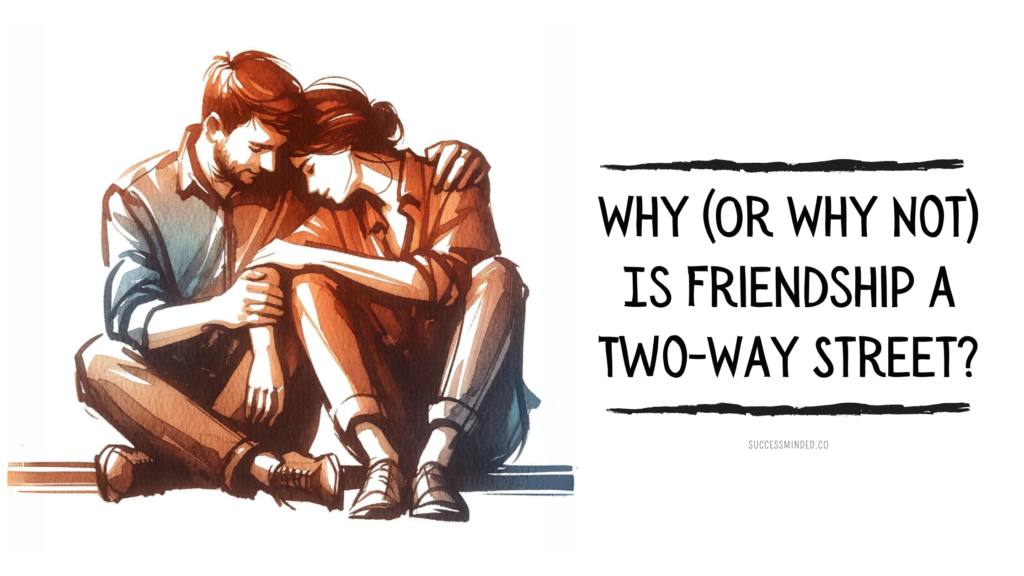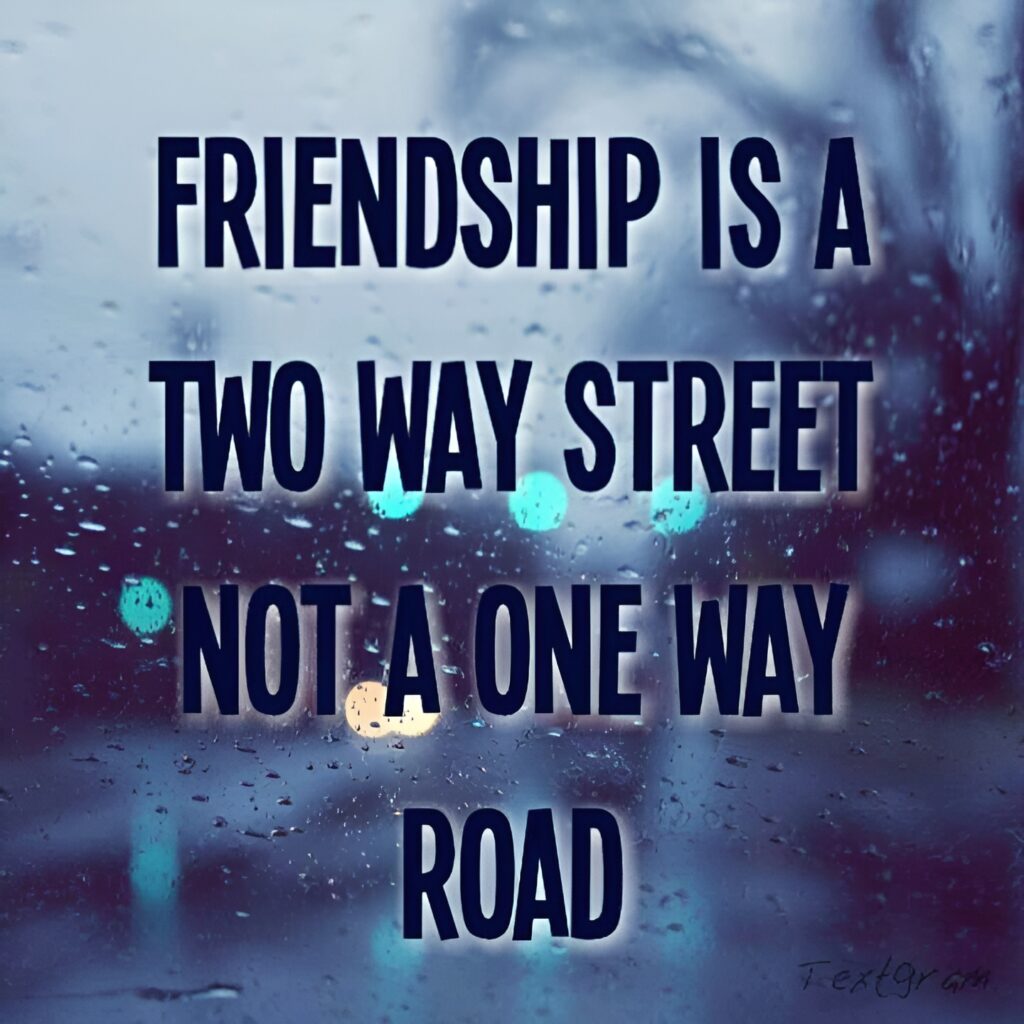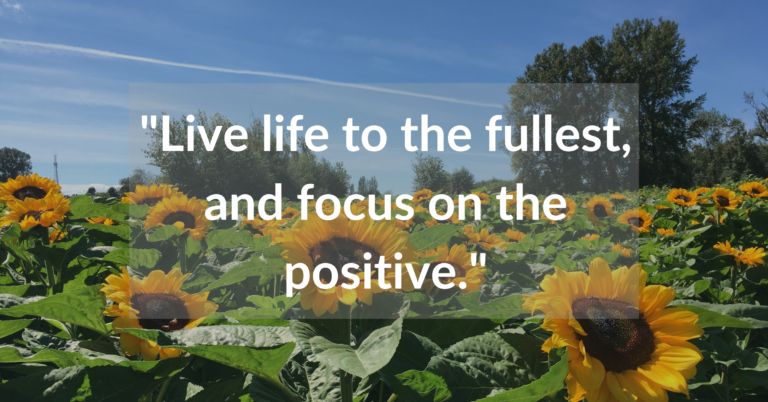Friendship is a cherished connection that is as ancient as humanity itself. Friends celebrate our joys, share our burdens, and enrich our lives in countless ways. There’s a common belief that for a friendship to thrive, it should be a two-way street—a mutual path of give-and-take. But what does that really mean?
In this article, I’ll delve into the depths of reciprocal friendship, examining its importance and also the complexities that sometimes make the reality less straightforward.

The Fundamentals of Reciprocal Friendship
Reciprocal friendship is grounded in the concept of mutual exchange. It’s an unwritten agreement that both friends will invest emotionally, support each other, and find common value in their relationship. This give-and-take is the foundation upon which strong, enduring friendships are built. It fosters a balanced connection where both individuals feel seen, heard, and valued.
In the fabric of friendship, equality, and balance are essential threads. They prevent one friend from feeling overburdened or underappreciated. When these elements are in harmony, friendships flourish.
Each person brings their unique strengths and vulnerabilities to the table, creating a rich tapestry of shared experiences and support. Without this balance, the relationship can become strained, leading to feelings of resentment or neglect.
The Benefits of Two-Way Friendships

“Friendship is a Two-Way Street, not a One-Way Road.”
The advantages of reciprocal friendships are vast. Psychologically, they provide a safety net, a sense of security knowing someone has your back. Emotionally, these friendships are a source of joy and comfort, particularly during tough times. They play a critical role in our personal growth and well-being, offering a mirror through which we can see ourselves more clearly.
These relationships also contribute to a sense of belonging and community. When we know that our feelings and efforts are reciprocated, we’re more likely to feel connected to a larger group.
This mutual support system can encourage us to take risks and step out of our comfort zones, secure in the knowledge that our friends will be there to support us, come what may.
Reciprocity in friendship is not just about equal exchange; it’s about the value that such exchanges bring to our lives. A kind word, a listening ear, or a shared laugh—these are the currencies of a two-way friendship that can make all the difference in our hectic, often challenging world.
When Friendship Seems One-Sided

There are times, however, when the scales of friendship tip, and the give-and-take becomes lopsided. One friend may consistently reach out, make plans, and provide support, while the other seems passive or disengaged. This imbalance can lead to feelings of loneliness and frustration, and the one putting in more effort might feel unvalued or overlooked.
Several factors can lead to a friendship feeling one-sided. Life changes such as moving, starting a new job, or entering a romantic relationship can shift priorities and the amount of time and energy someone has for friends.
It’s also possible that as individuals grow and change, the friendship that once was a perfect fit no longer aligns as well with one or both people’s lives.
Recognizing the signs of a one-sided friendship is crucial. It might manifest as a lack of enthusiasm, infrequent communication, or an imbalance in initiative. Acknowledging this can be painful, but it’s important to understand that friendships, like all relationships, can go through phases and sometimes come to a natural end.
The Dynamics of Giving and Receiving
Understanding the dynamics of giving and receiving is essential in navigating friendships. Not all contributions to a friendship are tangible, and different friends may offer different types of value. One friend might be the planner, orchestrating get-togethers and keeping the friendship active, while another might be the confidant, offering a shoulder to lean on in times of need.
The key to balance is recognizing and valuing these diverse contributions. It’s also important to communicate when you feel the balance is off. A conversation can often realign expectations and contributions, ensuring that both friends are on the same page. Sometimes, a friend may not realize they’ve been taking more than they’ve been giving, and a gentle nudge can remind them of the importance of reciprocity.
However, if the imbalance persists despite attempts to address it, it may be necessary to reassess the friendship.
Are the benefits of the relationship worth the emotional cost of feeling undervalued? Sometimes, the answer is ‘yes’ because the friendship has a deep-rooted significance, and other times, it might be no, signaling that it’s time to move on. The decision is deeply personal and requires honest self-reflection.
Is It Always 50/50? Re-examining Friendship Expectations
The idea that friendships should always be an equal, 50/50 split in terms of effort and support is an oversimplification. The truth is, friendships ebb and flow; they’re dynamic, not static.
There will be times when one friend needs more support, and the scales naturally tilt to accommodate that need. The balance may shift back and forth over time, reflecting the fluctuating circumstances and challenges each person faces.
Re-examining our expectations of friendship means acknowledging that what each friend can contribute will vary at different times. Compassion and empathy are crucial in navigating these changing dynamics.
A friend going through a hard time may not be able to give much, but that doesn’t mean the friendship has lost its value. Instead, it may be an opportunity for growth and deepening of the bond as roles shift and support is redefined.
The strength of a friendship isn’t just measured by how evenly balanced it is but by how well it withstands the fluctuations of life. Recognizing that reciprocity can look different at different times is key to maintaining a long-term, fulfilling relationship.
Fostering Healthy Friendships

Nurturing healthy, reciprocal friendships involves a few key practices. It starts with communication—being open about your needs and willing to listen to your friend’s needs.
Boundaries are also important; they ensure that you respect each other’s limits and maintain a healthy level of give-and-take.
Regular check-ins can help maintain this balance. These can be casual conversations where you share how you’re feeling about the friendship and discuss any adjustments that might be needed. It’s also important to show appreciation for your friends and the efforts they make. This recognition can go a long way in reinforcing the positive aspects of the relationship.
However, if a friendship consistently leaves you feeling drained or unappreciated, it may be time to consider stepping back. This doesn’t have to be a dramatic end to the friendship but rather a gentle shift in focus and energy, giving you space to invest in relationships that are more mutually supportive.
Conclusion
Friendship is often described as a two-way street, and ideally, it is. It’s built on a foundation of mutual support, shared experiences, and reciprocal affection.
However, friendships are as complex as the individuals within them, and they don’t always follow a straightforward path. By embracing the ebb and flow of relationships, communicating openly, and maintaining healthy boundaries, we can foster friendships that are balanced and fulfilling, even if they’re not always perfectly equal.
Reflect on your friendships, strive for reciprocity, but also understand the complexities and the unique contributions each friend brings to your life. These are the connections that help us grow, learn, and navigate the rich tapestry of human experience.



